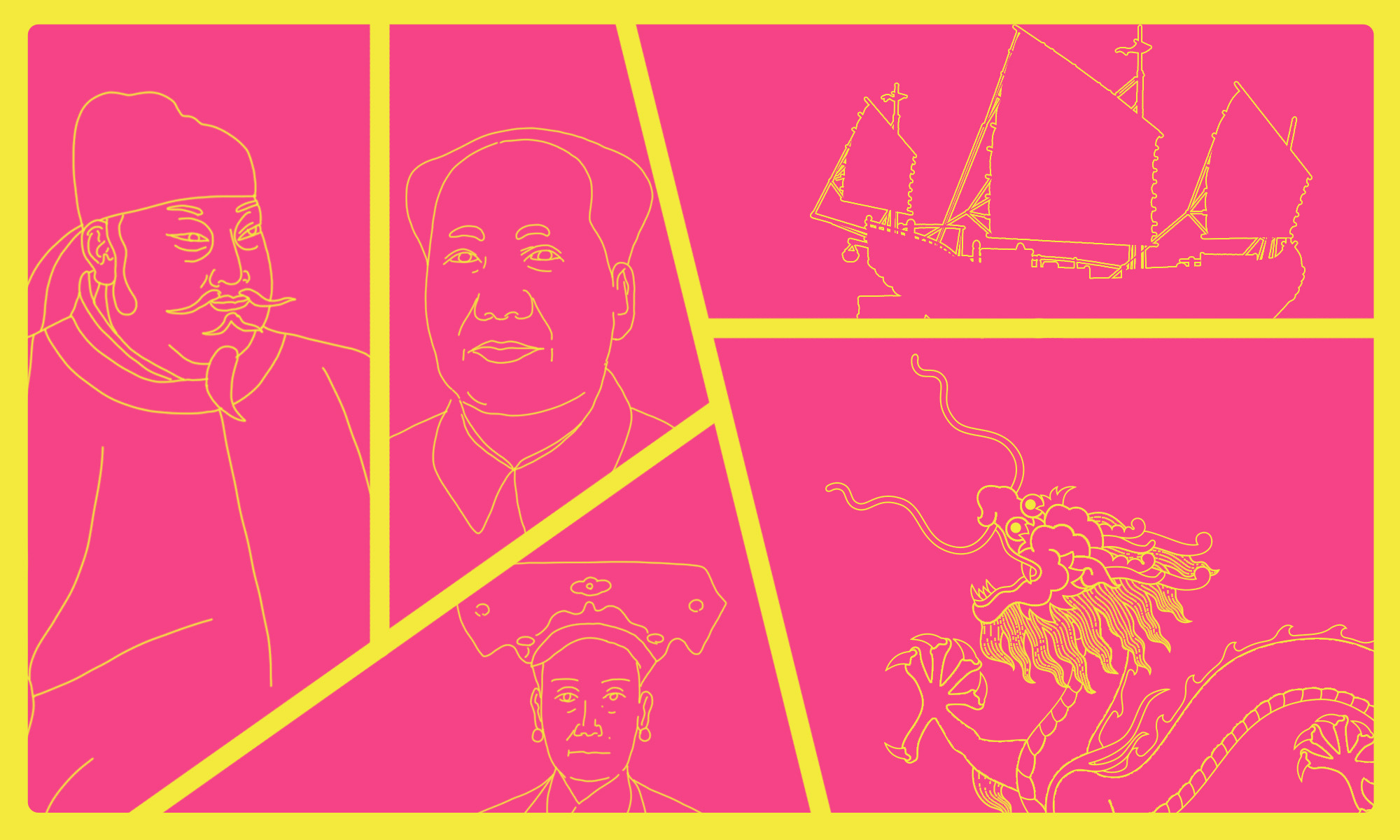Live from Chicago: Decoding China — China’s economic miracle interrupted?
Update: 2023-10-19
Description
This week on Sinica, a live recording from October 10 in Chicago, Kaiser asks Chang-Tai Hsieh of the Booth School of Business at the University of Chicago, Damien Ma of the Paulson Institute’s think tank MacroPolo, and our own Lizzi Lee, host of The Signal with Lizzi Lee, to right-size the peril that the Chinese economy now faces from slow consumer demand, high youth unemployment, a troubled real estate sector, and high levels of local government debt. This event was co-sponsored by the University of Chicago’s Becker-Friedman Institute, the Paulson Institute, and The China Project.
06:32 – What is the current state of the Chinese economy?
11:14 – The origins of China’s crisis in comparison with crises from 1990 in Japan and 2008 in the U.S.
14:25 – The real estate sector’s role in the crisis and possible solutions.
22:51 – The significance of able management during times of crisis. Is this a crisis of confidence or expectations?
29:34 – The question of the general direction of the Chinese economy.
43:33 – What does an actual debt crisis look like in China?
48:00 – The right U.S. policy toward China in light of current affairs.
Transcript
Kaiser Kuo: Welcome to this special live recording of the Sinica Podcast here in Chicago, Illinois. Hello, Chicago. I am Kaiser Kuo, and we are here tonight with this terrific and very handsome and well-appointed crowd from Chicago at an event put on by the University of Chicago’s Becker Friedman Institute for Economics, a program that pulls together folks from Chicago’s Booth School of Business with its Kenneth G. Griffin Department of Economics, its Harris School of Public Policy, and its law school. Becker Friedman has partnered with the Paulson Institute, and its in-house think tank MacroPolo — still, the cleverest name ever given to an organization dedicated to research on China, MacroPolo. Let that sink in for a little while. It’s amazing. And with The China Project, of which this podcast is a proud part. We are all joining together to bring you tonight’s program — “Decoding China: China’s economic miracle interrupted?”
A huge thank-you to our friends at the Becker Friedman Institute and at the Paulson Institute for making this happen in this magical spot. The sun’s coming down, and you look at the beauty of just the amazing Chicago skyline, what a view. If I am, sort of, not listening and wandering off, distracted, you’ll know exactly why. There’s so much to talk about, so let’s jump in. All summer long, we have heard deep pessimism about the state of the Chinese economy. There is a long litany of woes that have been repeated and amplified to the extent that I’ve gotten, frankly, kind of suspicious. Flagging consumer demand. We all know the stubbornly high savings rate accompanying that, the obvious problems faced now by major residential realty developers like Evergrande and Country Garden, high levels of youth unemployment, and, of course, enormous local government debt.
Now, none of my guests today are the economists that American presidents and CEOs have often wished they had at hand. That is, economists with only one hand, and they don’t always say, "On the one hand, and, on the other hand." As for me, I don’t mind hearing or engaging a little, on the one hand, myself. So, on the one hand, ordinarily, when I do hear this level of hyper-pessimism, this sheer volume of doomsaying, much of it built on, frankly, motivated reasoning, my instinct is to be very skeptical. China, after all, has defeated, has defied predictions of doom many a time, including in the Asian financial crisis of 1997 and in the great recession after 2008, the crisis of 2015 when the Chinese stock market plummeted. It seems like it’s always able to muddle through.
On the other hand, as a growing number of people whose views I very much trust have come back from trips to China recently, it’s clear to me that the pessimism isn’t by any means limited just to these distant economists or reporters writing about China from the outside. When we hear about the PTSD, the shell shock caused in places like Shanghai by the lockdowns and by the chaotic, confusing end to the COVID restrictions, coupled with this kind of flagging exports, weak signals from the manufacturing sector, unemployment, and, of course, confusion in policy direction overall, I do worry. I take the bears a little more seriously.
Yet, back to that other hand, an economist whom I greatly respect, Arthur Kroeber from Gavekal Dragonomics, gave a very good talk at Harvard recently. He said that this bad news has been enlisted by some in claiming that their grand narratives, going back decades, were correct all along [cough], Gordon Chang. A relatively small amount of data, he notes, is being made to do an awful lot of work. That’s true. Today is really all about right-sizing the problem where the negativity might perhaps be warranted, and where it certainly is not, as well as identifying problems that perhaps aren’t being given sufficient attention in the reportage that we’re all reading. We’ll talk about the nature of the crisis and the nature of the state response, such as it is. Joining me to attack this important question with both hands, as it were, and to try to get this right is Chang-Tai Hsieh, who is the Phyllis and Irwin Winkelried Distinguished Service Professor of Economics at the Booth School, who specializes in development and growth in the developing world. He’s an elected member of the Academia Sinica, I like that name, and a two-time recipient of the Sun Ye-Fang Prize. Chang-Tai, welcome to Sinica, again.
Chang-Tai Hsieh: Thank you. Great to be here.
Kaiser: Good up. Also joining is Lizzi Lee, who’s well known to folks who listen to Sinica or who follow The China project. She is the host of our YouTube show, The Signal With Lizzi Lee, where she does interviews with amazing people. She’s just a really expert interviewer. Lizzi also hosts the Chinese language show, Wall Street TV, Wall Street Today rather, 今日華爾街 [Jīnrì huá'ěrjiē], which is something I highly recommend. It’s about the only non-lunatic Chinese-language programming. I mean, everything else is either like hardcore party line or freaking Falun Gong, or what’s that cook’s name? Guo Wengui, right? And then there’s Lizzi, who’s like an island of sanity on YouTube.
Lizzi Lee: The bar is pretty low.
Kaiser: Anyway, the last time that we were together with Damien was here in Chicago. Our friends at the Chicago Council summoned us to do a sort of roundup of the 20th Party Congress, where some very, very interesting remarks were made. That takes us, of course, to Damien Ma, who is director of MacroPolo, the think tank of the Paulson Institute. Damien is the co-author of a great book, which I’m still constantly recommending to people. It’s really stood the test of time. It’s called In Line Behind a Billion People. It really looks at a lot of issues related to China’s economy and politics through the lens of scarcity. It’s a very, very good book. I highly recommend it. Damien is always one of the people I turn to for the straight dope on what’s happening in the Chinese economy. Damien, great to see you, man.
Damien Ma: Very good to see you.
Kaiser: Lizzi, Chang-Tai, what a great crowd we’ve had. Damien, let me start with you. You were just in China. You got back just a little over a week ago. You had both high-level meetings and some means or boots on the ground, some shoe leather work. Just talking to people who are either decision makers, economic decision makers at the enterprise level or above, and people who are just directly affected by the economy in China, people who’ve experienced the chaotic end of COVID and everything. What’s the skinny? What’s your overall takeaway from talking to people? Are things as bad as they say?
Damien: Well, let me give a sort of two quick, but different observations. I think Kaiser, like you or Lizzi, when we go to China, we tend to not just stay in the hotel. I got there a few days early, so I could, first, walk around, do my own observations. Small things like, are the malls full? Right? Are people buying things? How normal does Beijing look? And caveat that, I mostly interacted with a very small slice of Beijing elites, so they’re not what I would call the true 老百姓 [lǎobǎixìng], right? They are still Beijing elites. So take that with a grain of salt. I talked to Chinese colleagues and talked to the dwindling number of foreign correspondents who are still fighting the good fight in Beijing, just to get a pulse from the people. And had my share of cabby conversations.
Kaiser: Oh, those cabby conversations.
Damien: The reason I wanted to have the cabby conversations, this is probably one interesting tangential observation, is that something like 90% of Beijing cabs are now electric vehicles made by a stand-owned enterprise. This really happened over the last several years. So, if you want to see the transformation in electric vehicles, look no further than Beijing City itself. And this is purely a stay-mandated drive. They basically wanted to help the state-owned enterprise. If you went to China prior to the pandemic, you would’ve probably ridden in a South Korean Hyundai. Those basically do not exist anymore. They’re all-electric vehicles now. So, if you want to get a little small slice of that change, Beijing does give you that little insight. But in terms of the economy, I’ll just say a couple things, and I think they’re the things we’re going to get into quite a bit with the other guests as well.
Talking to people, talking to friends and colleagues, there does seem to be a sense of just things not going that well. People are not seeing the bright light at the end of the tunnel in terms of the economy. In this sense, the Chinese
06:32 – What is the current state of the Chinese economy?
11:14 – The origins of China’s crisis in comparison with crises from 1990 in Japan and 2008 in the U.S.
14:25 – The real estate sector’s role in the crisis and possible solutions.
22:51 – The significance of able management during times of crisis. Is this a crisis of confidence or expectations?
29:34 – The question of the general direction of the Chinese economy.
43:33 – What does an actual debt crisis look like in China?
48:00 – The right U.S. policy toward China in light of current affairs.
Transcript
Kaiser Kuo: Welcome to this special live recording of the Sinica Podcast here in Chicago, Illinois. Hello, Chicago. I am Kaiser Kuo, and we are here tonight with this terrific and very handsome and well-appointed crowd from Chicago at an event put on by the University of Chicago’s Becker Friedman Institute for Economics, a program that pulls together folks from Chicago’s Booth School of Business with its Kenneth G. Griffin Department of Economics, its Harris School of Public Policy, and its law school. Becker Friedman has partnered with the Paulson Institute, and its in-house think tank MacroPolo — still, the cleverest name ever given to an organization dedicated to research on China, MacroPolo. Let that sink in for a little while. It’s amazing. And with The China Project, of which this podcast is a proud part. We are all joining together to bring you tonight’s program — “Decoding China: China’s economic miracle interrupted?”
A huge thank-you to our friends at the Becker Friedman Institute and at the Paulson Institute for making this happen in this magical spot. The sun’s coming down, and you look at the beauty of just the amazing Chicago skyline, what a view. If I am, sort of, not listening and wandering off, distracted, you’ll know exactly why. There’s so much to talk about, so let’s jump in. All summer long, we have heard deep pessimism about the state of the Chinese economy. There is a long litany of woes that have been repeated and amplified to the extent that I’ve gotten, frankly, kind of suspicious. Flagging consumer demand. We all know the stubbornly high savings rate accompanying that, the obvious problems faced now by major residential realty developers like Evergrande and Country Garden, high levels of youth unemployment, and, of course, enormous local government debt.
Now, none of my guests today are the economists that American presidents and CEOs have often wished they had at hand. That is, economists with only one hand, and they don’t always say, "On the one hand, and, on the other hand." As for me, I don’t mind hearing or engaging a little, on the one hand, myself. So, on the one hand, ordinarily, when I do hear this level of hyper-pessimism, this sheer volume of doomsaying, much of it built on, frankly, motivated reasoning, my instinct is to be very skeptical. China, after all, has defeated, has defied predictions of doom many a time, including in the Asian financial crisis of 1997 and in the great recession after 2008, the crisis of 2015 when the Chinese stock market plummeted. It seems like it’s always able to muddle through.
On the other hand, as a growing number of people whose views I very much trust have come back from trips to China recently, it’s clear to me that the pessimism isn’t by any means limited just to these distant economists or reporters writing about China from the outside. When we hear about the PTSD, the shell shock caused in places like Shanghai by the lockdowns and by the chaotic, confusing end to the COVID restrictions, coupled with this kind of flagging exports, weak signals from the manufacturing sector, unemployment, and, of course, confusion in policy direction overall, I do worry. I take the bears a little more seriously.
Yet, back to that other hand, an economist whom I greatly respect, Arthur Kroeber from Gavekal Dragonomics, gave a very good talk at Harvard recently. He said that this bad news has been enlisted by some in claiming that their grand narratives, going back decades, were correct all along [cough], Gordon Chang. A relatively small amount of data, he notes, is being made to do an awful lot of work. That’s true. Today is really all about right-sizing the problem where the negativity might perhaps be warranted, and where it certainly is not, as well as identifying problems that perhaps aren’t being given sufficient attention in the reportage that we’re all reading. We’ll talk about the nature of the crisis and the nature of the state response, such as it is. Joining me to attack this important question with both hands, as it were, and to try to get this right is Chang-Tai Hsieh, who is the Phyllis and Irwin Winkelried Distinguished Service Professor of Economics at the Booth School, who specializes in development and growth in the developing world. He’s an elected member of the Academia Sinica, I like that name, and a two-time recipient of the Sun Ye-Fang Prize. Chang-Tai, welcome to Sinica, again.
Chang-Tai Hsieh: Thank you. Great to be here.
Kaiser: Good up. Also joining is Lizzi Lee, who’s well known to folks who listen to Sinica or who follow The China project. She is the host of our YouTube show, The Signal With Lizzi Lee, where she does interviews with amazing people. She’s just a really expert interviewer. Lizzi also hosts the Chinese language show, Wall Street TV, Wall Street Today rather, 今日華爾街 [Jīnrì huá'ěrjiē], which is something I highly recommend. It’s about the only non-lunatic Chinese-language programming. I mean, everything else is either like hardcore party line or freaking Falun Gong, or what’s that cook’s name? Guo Wengui, right? And then there’s Lizzi, who’s like an island of sanity on YouTube.
Lizzi Lee: The bar is pretty low.
Kaiser: Anyway, the last time that we were together with Damien was here in Chicago. Our friends at the Chicago Council summoned us to do a sort of roundup of the 20th Party Congress, where some very, very interesting remarks were made. That takes us, of course, to Damien Ma, who is director of MacroPolo, the think tank of the Paulson Institute. Damien is the co-author of a great book, which I’m still constantly recommending to people. It’s really stood the test of time. It’s called In Line Behind a Billion People. It really looks at a lot of issues related to China’s economy and politics through the lens of scarcity. It’s a very, very good book. I highly recommend it. Damien is always one of the people I turn to for the straight dope on what’s happening in the Chinese economy. Damien, great to see you, man.
Damien Ma: Very good to see you.
Kaiser: Lizzi, Chang-Tai, what a great crowd we’ve had. Damien, let me start with you. You were just in China. You got back just a little over a week ago. You had both high-level meetings and some means or boots on the ground, some shoe leather work. Just talking to people who are either decision makers, economic decision makers at the enterprise level or above, and people who are just directly affected by the economy in China, people who’ve experienced the chaotic end of COVID and everything. What’s the skinny? What’s your overall takeaway from talking to people? Are things as bad as they say?
Damien: Well, let me give a sort of two quick, but different observations. I think Kaiser, like you or Lizzi, when we go to China, we tend to not just stay in the hotel. I got there a few days early, so I could, first, walk around, do my own observations. Small things like, are the malls full? Right? Are people buying things? How normal does Beijing look? And caveat that, I mostly interacted with a very small slice of Beijing elites, so they’re not what I would call the true 老百姓 [lǎobǎixìng], right? They are still Beijing elites. So take that with a grain of salt. I talked to Chinese colleagues and talked to the dwindling number of foreign correspondents who are still fighting the good fight in Beijing, just to get a pulse from the people. And had my share of cabby conversations.
Kaiser: Oh, those cabby conversations.
Damien: The reason I wanted to have the cabby conversations, this is probably one interesting tangential observation, is that something like 90% of Beijing cabs are now electric vehicles made by a stand-owned enterprise. This really happened over the last several years. So, if you want to see the transformation in electric vehicles, look no further than Beijing City itself. And this is purely a stay-mandated drive. They basically wanted to help the state-owned enterprise. If you went to China prior to the pandemic, you would’ve probably ridden in a South Korean Hyundai. Those basically do not exist anymore. They’re all-electric vehicles now. So, if you want to get a little small slice of that change, Beijing does give you that little insight. But in terms of the economy, I’ll just say a couple things, and I think they’re the things we’re going to get into quite a bit with the other guests as well.
Talking to people, talking to friends and colleagues, there does seem to be a sense of just things not going that well. People are not seeing the bright light at the end of the tunnel in terms of the economy. In this sense, the Chinese
Comments
In Channel
























